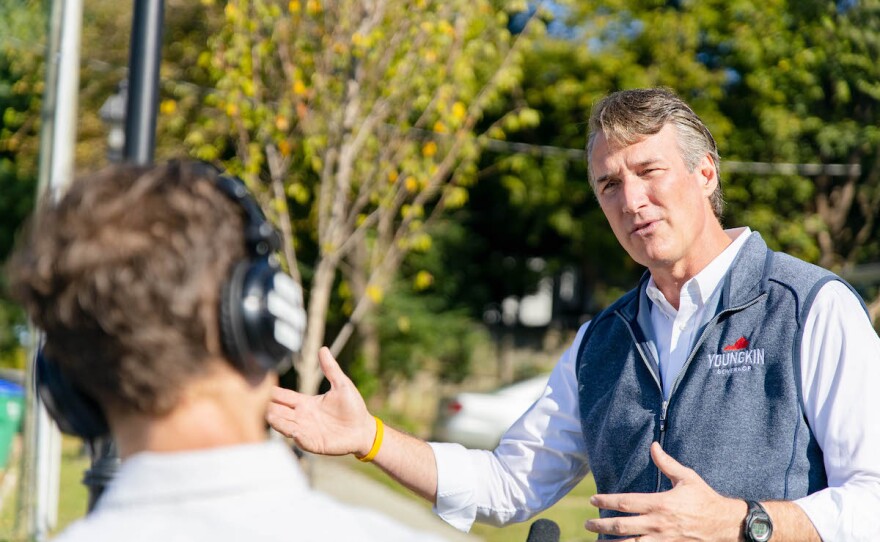Speaker: Gov. Glenn Youngkin
Statement: “In Virginia, we actually do protect same-sex marriage.”
Date: July 10
Setting: TV interview
Gov. Glenn Youngkin was elusive when recently asked if he would take action to guarantee same sex-marriage under Virginia law.
“In Virginia, we actually do protect same-sex marriage,” Youngkin, a Republican, told a national television audience Sunday on “Face the Nation.” “That’s the law in Virginia and therefore, as governor of Virginia, we protect same-sex marriage.”
A number of state Democrats later accused Youngkin of spreading — to put it nicely — malarkey.
“The Governor either doesn’t know Virginia’s constitution or he’s lying & assuming we won’t notice,” tweeted U.S. Rep. Abigail Spanberger. State Sen. Adam Ebbin, of Alexandria, told the Richmond Times-Dispatch, “Either [Youngkin] is ignorant of the status of gay marriage in Virginia or chose to lie.”
So, we fact checked Youngkin’s statement.
Same-sex marriage in Virginia and across the nation is guaranteed by the 2015 U.S. Supreme Court decision in Obergefell v. Hodges.
But here’s what Youngkin didn’t mention on camera: The Obergefell decision, made on a 5-to-4 vote, supersedes a still-existing provision in Virginia’s constitution that prohibits same-sex marriage. Should the current conservative majority on the high court reverse Obergefell, same-sex marriage would instantly become illegal in Virginia.
Virginia’s constitutional ban on same-sex marriage was approved by voters in 2006. The General Assembly passed a bill in 2021 to ask voters to repeal the amendment. But proposed amendments to Virginia’s constitution must be passed by the legislature two straight years before they’re placed on ballots and, earlier this year, a subcommittee in the Republican-led House killed the bill on a 6-to-4 vote.
Youngkin’s press secretary, Macaulay Porter, noted that the General Assembly passed legislation that repealed a state law barring same-sex marriage. But state laws are subservient to Virginia’s constitution, which still has the ban.
The constitutional amendment “makes it clear that no other relationship may, by law, be given the status of a legal marriage,” A.E. Dick Howard, a professor at the University of Virginia’s law school, wrote in an email. “If Obergefell were to be overturned, then, in Virginia, the marriage amendment would take precedence over any conflicting provision of state law. Same-sex marriages would not be recognized in Virginia.”
Carl Tobias, a professor at the University of Richmond’s law school, agreed. “If the Supreme Court reversed itself, same-sex marriage would become illegal [in Virginia],” he said.
Obergefell’s future
A key question is whether the Obergefell decision is in danger of being reversed, a matter Youngkin dismissed as “ hypothetical.” But many legal observers and members of the LGBTQ+ community see it as a real possibility following the Supreme Court’s June reversal of Roe v. Wade, a 49-year-old precedent guaranteeing abortion rights. The court empowered states to set their own abortion laws.
Justice Clarence Thomas deepened concerns in his concurring opinion, writing that the court should review its decisions in Obergefell and other “demonstratively erroneous” cases that have granted rights not specifically mentioned in the U.S. Constitution. Other justices in the majority did not echo Thomas’s sentiment and stressed that their ruling only applied to abortion.
Our ruling
Youngkin said, “In Virginia, we actually do protect same-sex marriage. That’s the law in Virginia and therefore, as governor of Virginia, we protect same-sex marriage.”
His statement is disingenuous. The only reason Virginia protects same-sex marriage is because a 2015 Supreme Court ruling requires all states to do so.
Virginia law tacitly allows same-sex marriage. But it is superseded by the state constitution that specifically bans such unions, a provision that the Republican-led House stood by earlier this year. Should the high court reverse its 2015 ruling, as Thomas would like to see, same-sex marriage in Virginia would instantly end.
Younkin told viewers of “Face the Nation” a small piece of the story. Although Virginia allows gay marriage, the state law he cites as protecting it is meaningless.
We rate Youngkin’s statement Mostly False.
Sources
Glenn Youngkin, “ Face the Nation” interview, July 10, 2022 (7:10 mark)
Email from Macaulay Porter, press secretary for Youngkin, July 12, 2022
Abigail Spanberger, tweet, July 10, 2022
Email from A.E. Dick Howard, professor at the University of Virginia School of Law, July 13, 2022
Interview with Carl Tobias, professor at the University of Virginia School of Law, July 13, 2022
Richmond Times-Dispatch, “ Youngkin fumbles on same-sex marriage status in Virginia law,” July 12, 2022
Legal Information Institute, “ Obergefell v. Hodges,” June 26, 2015
Constitution of Virginia, Article 1, Section 15A, accessed July 13, 2022
Legislative Information System, HB605, 2022 session
The Washington Post, “ Virginia House panel strikes down effort to remove same-sex marriage ban from constitution,” Feb. 8, 2022
The Washington Post, “ Youngkin defends portrayal of gay-marriage rights as business ranking slips,” July 13, 2022
Supreme Court of the United States, “ Dobbs v. Jackson Women’s Health Organization,” June 24, 2022


